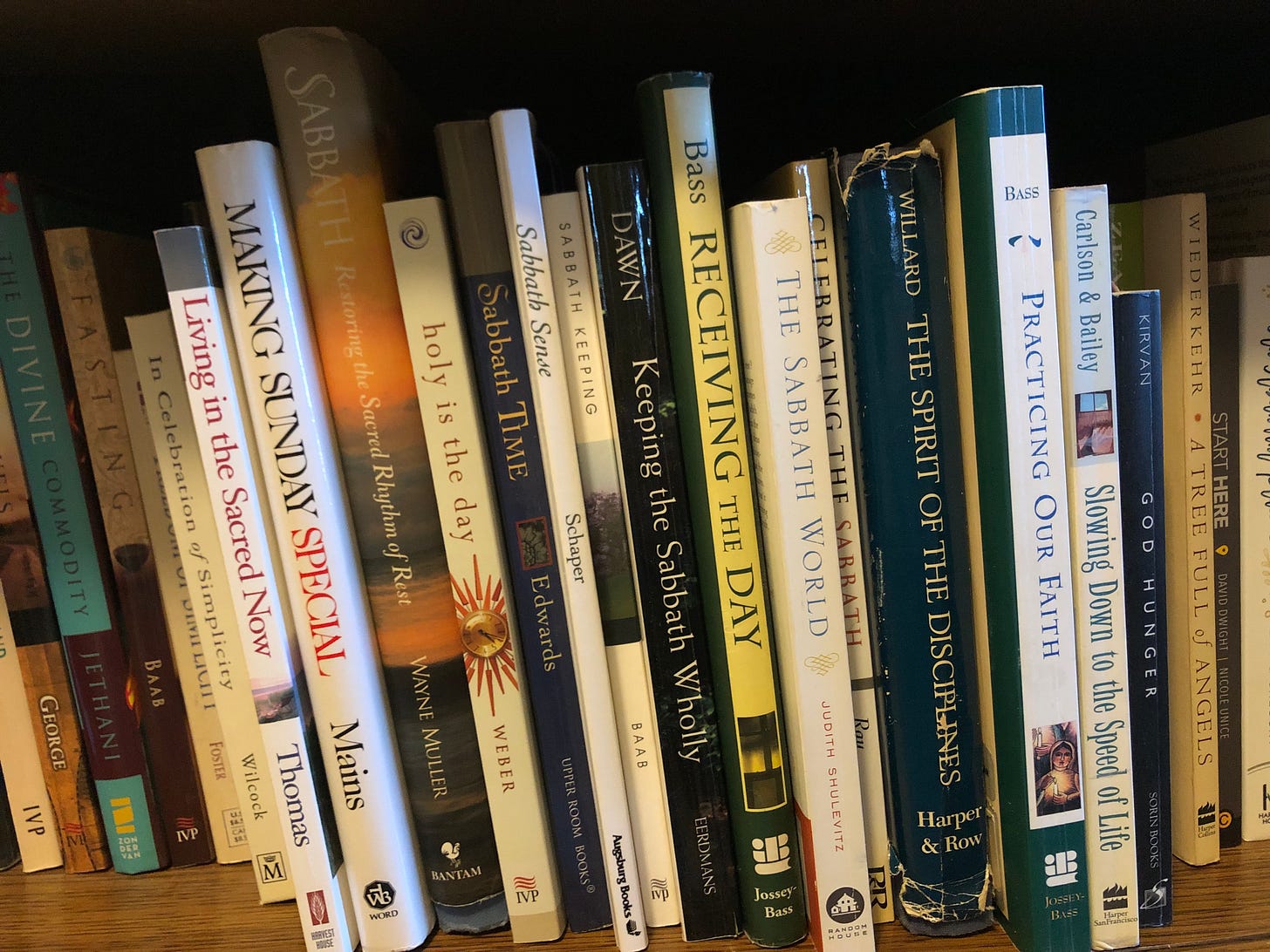Lean in to your curiosity
How to research your nonfiction book
A non-fiction book is not an island. It is, rather, a building in a city of ideas. One voice of many in a conversation. Employ whatever metaphor you want, but you are not the first person to write about whatever topic you are writing about. However, you do have something to add to that conversation.
My own non-fiction books (I’ve written a dozen of them) often began with a question or dilemma in my own life. I’d often follow the old advice of writing a book that I wish I could read.
How do I nurture my spiritual life while raising preschoolers? (God’s Whisper in a Mother’s Chaos)
How do I hear God? (Listen)
How is the pace of my life related to my experience of God? (Breathe)
My writing is driven by my commitment to be curious. While I share my thoughts on a topic, and contribute to the conversation, I also want to learn by writing. I want to always nurture my curiosity, and research allows me to do that.
Writing a book begins with drilling down on our curiosity. Before you write—read. Another way to say it: Before and while you write a non-fiction book, you need to do research.
Photo by cottonbro studio: https://www.pexels.com/
The benefits of research
Writers do research so that they can:
1. Be informed about the topic
The term “research” may conjure memories of schoolwork or science or other unpleasant past experiences. But if you think of research as simply leaning in on your curiosity, it will feel easier and more interesting.
Research helps you know what else is being written or said about your topic. It provides other views that you can compare and contrast to your own.
If you’ve ever been a part of a conversation where someone simply repeats what’s already been said, you know how boring and yet frustrating that can be. Research helps you listen to what’s already been said (or written) and figure out how you can contribute new ideas to the conversation.
2. Write a solid book proposal
IF you are writing a book proposal to try and sell your book idea to a traditional publisher, it will need to include a list of competing titles and explain, specifically, how each is different from yours. The only way to compile that list is to do research.
That research might mean a trip to the library, but it also might include a scroll through amazon, goodreads, or other online book sellers, where you can read summaries and reviews of books on your topic, and also see “customers who bought” lists that will show you other books on the topic.
You don’t need to read every other competing title. But those that seem closest to your topic are worth skimming. Why? So you can contribute to the conversation when you join in. And so that you can avoid saying what has already been said.
3. Find quotes and stats
Doing research can also find quotes and facts that you can cite in your own book in the pages of other books. Keep a running list of quotes (along with bibliography info) to use as chapter headers, sidebars, or to incorporate into your work.
You might find quotes in other books. You can also research by interviewing experts. In many of my books, I interviewed people so that I could include their stories and interweave them with my own.
I’ve written several books on the topic of Sabbath (Breathe, Rest, GodSpace). I’ve written articles and blog posts about it. (Read a few here.) I’ve also read a ton of other books about Sabbath. I sometimes quoted those other books in my work, or sometimes just read and pondered their ideas. Reading and pondering –that’s research.
The Sabbath section of my bookshelf.
No matter where you use other people’s words (or even ideas), be sure to cite them properly with footnotes, and a mention in the text.
The downside of research
If you are an expert in a particular topic, you can often write out of that expertise, and don’t need much research. (Although, you likely became an expert by learning about that topic—doing research without calling it that.)
However, research has a downside. It can lead you into several writer traps. Here’s how to avoid those pitfalls but still do accurate and thorough research for your book. How much research do you need? Short answer: enough, but not too much.
When you do research, avoid:
1. Using research to put off actually writing.
It’s hard to sit down and actually write. Every writer has likely developed procrastination into an art form—and research is a great way to put off writing. It’s “working” on the book, indirectly, so it can feel productive. While it’s an essential part of the process, it’s easy to make research too much of the process.
The Internet is like a vortex, sucking you off course. You can start off with good intentions to Google a few facts that will support your ideas and end up watching cat videos. Stay focused. Set a time limit for research, take notes, but then, write.
As you write, if you get to a place where you think, “I need to look this up,” don’t do it right then. Put a note right there in the page. I use “check this” (so I can search for it later) or highlight it. Let the ideas flow, you can fact-check on your second draft.
Or keep a running list of things to research later. Set aside time where you will research, and time when you will write.
2. Letting research feed insecurities.
Research, especially about competing titles, can also lead writers to the bad habit of comparison. I remember when I was working on my first book, I went to Barnes and Noble and looked at the bookshelf full of “mom books” and nearly cried. So many Christian mommy writers had offered bits of wisdom on parenting, faith, etc. What on earth did I think I had to contribute to that conversation? Would anyone want to read it?
A wise writer told me—they may write about similar topics, but no one has your story, your experiences, your voice. Your book will be unique if you trust your story and your calling. That book is still in print after 23 years, by the way.
3. Believing false information.
There is a lot of information out there. Some is accurate, some is not. Check sources, avoid repeating urban myths, misinformation or outright lies.
This pitfall can provide an opportunity—to develop discernment. Test everything, make sure it is accurate. Don’t quote unreliable sources. Don’t repeat slander or lies. Nonfiction writing is just that: it’s not fiction. It’s true. Make sure that’s the case with your book.
4. Relying too much on others’ ideas.
While it’s good to have other sources to back up your ideas, don’t overdo it. You’re writing a book to share your ideas, not just summarize what others have already said. Be brave and assert your own ideas. Trust yourself. Rather than just quoting other sources, respond to their ideas with your own take on the topic. Don’t be afraid to lean in and share your ideas and your experiences. (But be sure to properly cite other books when you do quote them!)
The bottom line: balance
Doing research is an opportunity to learn, to grow. It’s a chance to follow your curiosity and expand your own knowledge. Research can help you understand a topic and what’s been written about it so far. It allows you to make a meaningful contribution to an ongoing conversation. But it can also lead to writer traps you want to avoid. Strike a balance, do just enough research, and then write your book!




